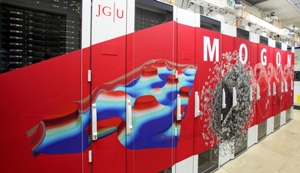May 29 2014
The German Research Foundation (DFG) has approved the establishment of a new collaborative research center (CRC) to be coordinated by Johannes Gutenberg University Mainz (JGU).
 The high-performance cluster MOGON at the JGU Center of Data Processing can carry out 287,000 billion computations per second. (photo: Stefan F. Sämmer)
The high-performance cluster MOGON at the JGU Center of Data Processing can carry out 287,000 billion computations per second. (photo: Stefan F. Sämmer)
The new CRC/Transregio "Multiscale Simulation Methods for Soft-Matter Systems" will focus on method development for computer-aided research on structural properties and processes of soft matter. Collaborative research centers are long-term DFG projects in fundamental research; CRC/Transregio projects are special in that their application must be submitted by several universities and/or institutions jointly. In addition to Mainz University as coordinator, the Technical University of Darmstadt and the Max Planck Institute for Polymer Research in Mainz will also be participating in the new CRC/Transregio. The German Research Foundation will fund the CRC/Transregio with about EUR 7 million over the next four years.
"The successful application for the new DFG-funded CRC/Transregio serves as an example of the fruitful collaboration of Mainz University, the Max Planck Institute for Polymer Research, and the Technical University of Darmstadt. These institutions have only just confirmed their intent by signing a cooperation agreement. This new research-related achievement demonstrates the exceptional potential of the Rhine-Main scientific hub and again underlines the excellence of the work being undertaken by our researchers in the field of materials science, which is – with good reason – one of the main disciplines shaping JGU’s research profile," said Minister of Science Doris Ahnen.
"At Mainz University, the new CRC/Transregio will combine research activities from the fields of mathematical modeling and soft matter. JGU’s Center for Computational Sciences in Mainz will be providing valuable support, proving once again how important this field is for innovative scientific research at our university," explained Professor Georg Krausch, President of Johannes Gutenberg University Mainz.
The work at the new CRC/Transregio will concentrate on multiscale modeling, a core aspect of materials science research. Soft matter represents an important class of materials that ranges from simple plastics to complex biomolecular systems and materials used in organic electronics applications. Their properties are determined by a subtle interplay of energy and entropy. Small changes in molecular interactions can lead to large changes in the macroscopic properties of a system. The CRC/Transregio 146 "Multiscale Simulation Methods for Soft-Matter Systems" will bring together physicists, chemists, applied mathematicians, and computer scientists in order to address some of the most pressing problems of multiscale modeling. The aim is to develop new simulation and analytical techniques that allow for the simulation of complex systems in the 'real world,' such as materials composed of many components and non-equilibrium processes in materials.
The Center for Computational Sciences in Mainz was established at JGU in 2007 in order to further promote the outstanding profile of the natural sciences in Mainz by developing innovative mathematical models and powerful computer simulation techniques. Among other things, the high-performance computer MOGON is available to researchers. The acquirement of the new MOGON II system was recently approved and should be operational by the first quarter of 2016. As MOGON I in 2012, it is expected that MOGON II will rank among the top 100 of the fastest high-performance computers worldwide.